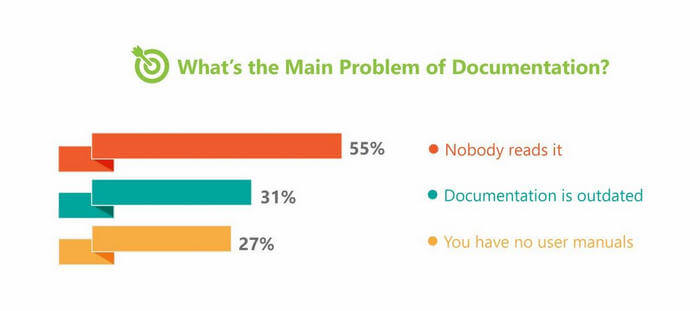
Our previous post was addressed to problems with technical documentation. So, we set up a poll on our Telegram Channel. According to it, technical writers’ biggest concern is that people don’t read documentation. Imagine how frustrating this is – all the work you put in just to learn it was pointless. This sounds demotivating.

Let’s try to understand what is stopping people from reading the manuals and how the industry needs to change to attract readers.
Fairytale Gone Bad
It is not like people don’t ever try reading technical documentation. Checking out a help topic is actually a very straightforward and logical option for a lot of users. They know that a user manual exists somewhere and that it supposedly holds the answers they seek. Since contacting support is a no go for many, they rather open a user manual hoping to quickly solve their problem.
Sadly, in most cases, technical documentation doesn’t look anything like a magical book that opens on the right page. Solving a problem starts taking longer than expected. Irritation grows, red herrings lead readers astray and they finally give up. They close the manual to, perhaps, never open it again. The first impression is ruined, end of story.
Are People Just Lazy?
Are people just lazy and that’s the problem? Some are, definitely. Also, nobody likes putting in that extra effort when it can be avoided. For people to actually read your documentation, it should meet certain standards. Readers often inherit these standards elsewhere but start applying them to any content they come across. Websites, apps, and social media are responsible for nurturing certain habits. So, readers now expect things from technical writers, too.
We are fed with smooth and well-portioned pieces of data daily. Marketing and UX teams have truly mastered their skills of how to serve information so that people would actually read it. We are talking about landing pages, commercials, sneak peeks, previews, infographics, etc. It seems like just having value is not enough anymore. People need to be interested in your user manuals.
Adoption is a burning question as well. Facing a single predicament can make users hesitant in whether they want the product. Years of perfecting UX resulted in user expectation soaring.

Adoption Matters
Technical writers create a lot of content for adoption purposes. And, nobody wants to be a weak link in this UX chain. So, as a techcomm pro, you need to make sure the technical texts you author meet the requirements. This starts with building up processes inside the documentation team and aligning their goals with other teams. Subject-matter experts can help create reliable content, this is one thing. Working closely with UX and Marketing is just as important to make sure that you are on the right track.
Choosing the right software for technical writing can take a ton of pressure off. What we offer at ClickHelp is a ready solution that integrates effortlessly into your workflow and gives you the right tools for shaping up the perfect UX for your readers. You won’t have to worry about minor stuff – invest your energy into creating great technical documentation while we take care of the rest.

Conclusion
In this blog, we are giving a lot of practical advice for creating better manuals. But, if we take a step back we might find that we are missing an important piece here – not everyone understands the real reason why they should even bother. For years, technical documentation was nothing more than a set of technical texts full of terminology and long sciency paragraphs.
Now, everyone is finally coming to terms with the idea that user manuals need to be something more. You can’t make someone read it, it is pointless. What you can do is create a superb experience for your readers. Build an environment where they want to linger – a place that provides guidance and answers without stressing readers out.
Good luck with your technical writing!
ClickHelp Team
Author, host and deliver documentation across platforms and devices



